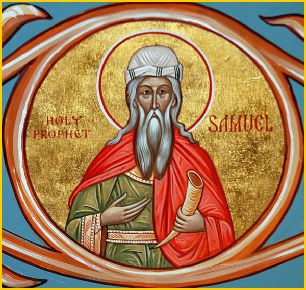|
|||
|---|---|---|---|
| This weekly bulletin insert complements the curriculum published by the Department of Christian Education of the Orthodox Church in America. This and many other Christian Education resources are available at http://dce.oca.org. | |||

The prophet Samuel is introduced to us in Scripture in a unique way. He is not yet a prophet the first time we read about him. Jeremiah is given a prophecy to deliver in the first chapter of the book named for him. Hosea receives a prophetic message in the second verse of his book. Isaiah's prophetic vision is described in the very first verse of the Book of Isaiah. We are told little about the childhoods or families of any of these prophets. Samuel, by contrast, is introduced not with prophecy but as a child who serves the priest Eli. We are told a lot about him. We know the names of his parents, Hannah and Elkanah, and that Elkanah was a loving husband. We know that the long-childless Hannah endured scorn from Elkanah's other wife, who did have children. We are given details of Hannah's devoted motherhood after the joyously welcomed birth of her son. She dedicates him to the Temple. Samuel's closeness to Eli at such an impressionable age, and his subservient position, make it difficult for him to do one of the things God asks of him. The Lord reveals to Samuel His plans to punish Eli for "the iniquity which he knew, because his sons were blaspheming God, and he did not restrain them" (I Samuel/I Kingdoms 3: 13). Though he is afraid to do so, Samuel must reveal this plan to Eli. In adulthood, Samuel bears other difficult responsibilities. He must console and encourage the Israelites as they fight the Philistines and are defeated time and again. When God instructs him to anoint Saul as king, Samuel obeys but then must stand by and watch Saul fall ever deeper into jealous rage against the young, charismatic and very able David. This terrible jealousy leads Saul to try to kill David, and the young man flees to Samuel for refuge. The two go together to Naioth in Ramah, but someone betrays their whereabouts to Saul and he sends messengers to hunt David down. But the atmosphere around Samuel is so holy that the messengers "prophesy" or, in other words, are overwhelmed by the presence of God. Saul sends two more groups of messengers, and the same thing happens to them. Finally Saul goes himself to kill David. But like the messengers he is overwhelmed and "prophesies." Saul is too far gone in his hatred to be redeemed by this experience. But it shows how close Samuel has become to God and how strongly other people are affected by being in the divine presence that surrounds him.
Samuel's influence is so great that even after he dies, Saul can't do without him. The Philistines are once again gathering their troops to make war on Israel, and the terrified Saul asks a medium to call Samuel from the dead so the prophet can advise him. This weird episode shows Saul's mad desperation. But it also shows the lasting power of a godly prophet like Samuel, who was "lent to the Lord" by his mother as a tiny child. |
|||
